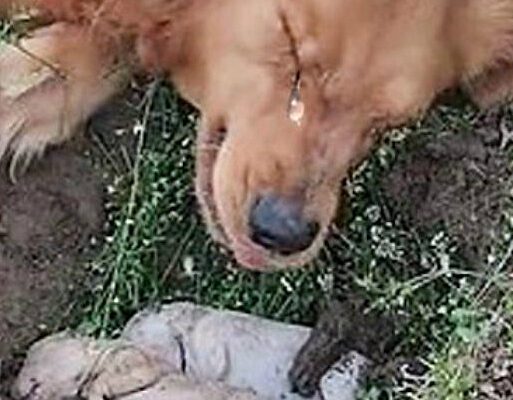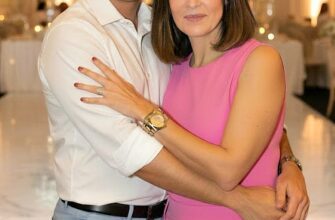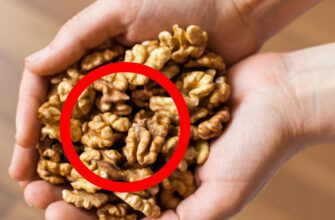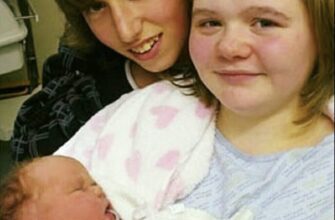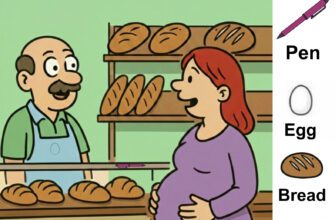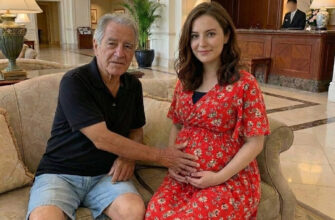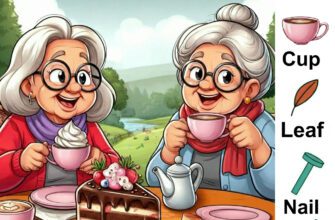Quiet, my dears… I’m here. Just a little while longer, and you’ll warm up. I’m breathing, so you can too. Do you hear?»
The grass under the red dog was wet and warm from her breath. She didn’t try to hold back her tears — they rolled down on their own, into the silence, where no one answered her with a squeak or funny sniffle. At the edge of a shallow hole lay three: the same golden ones as she, with tiny paws and a milky, not yet awakened muzzle. The rain had stopped, but heavy clouds were still crowding in the sky; somewhere in the neighboring garden, the crust of a bucket was knocking against a well ring — and that was all. The world narrowed to a mound of earth and her determination not to leave.
Four days ago, in an abandoned chicken coop outside the village, she had babies. She found a crack in the wall, dragged in some old straw, tucked warm rags under their sides that she pulled out from wherever, and hugged them with herself, as all mothers do when they have no one but their own paws. At night, dampness blew through the holes in the boards, but they squealed, moved, looked for her, greedily catching the milk. And she, without closing her eyes, counted their breaths.
On the fourth morning, a cold rainstorm hit. The damp stream pierced the nest, the wind reached the straw, and by midday the first puppy was quiet. She warmed him, licked him, changed places with the sleeping ones — suddenly life would return from her warmth. Life did not return. By evening, the second one died down. At night, when the rain seemed to decide to test how much one dog could withstand, the third one left.
She did not understand how to say goodbye properly. She simply stopped drinking and eating, pressed her whole body against them and lay there. When people came – neighbors from the last house – she raised her head and wiped a tear on the grass, but did not retreat.
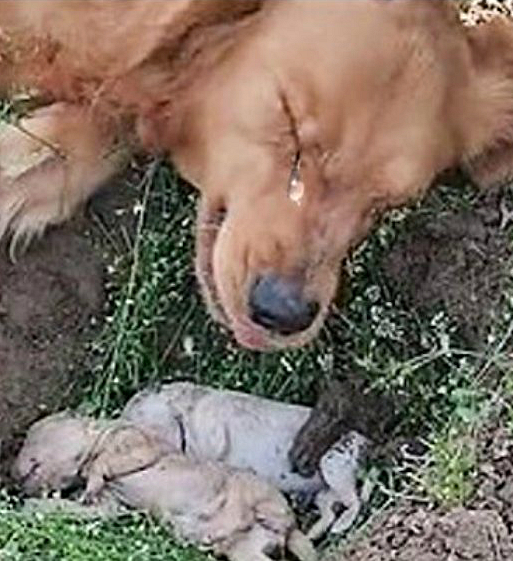
“Poor thing,” said the woman in the apron, stopping her husband. “Don’t touch her.”
“They need to be buried,” he answered quietly. “But first we need to take her… she’ll die.”
She growled in a low voice, barely audible, like a thunderstorm growling at the edge of the sky. But when the woman sat down next to her and whispered, “We’re here, dear, we’ll help,” the growling died down. The woman brought an old blanket, abandoned the cruel formalities of the village and simply sat with her, shoulder to shoulder, as if a person could lie as a guard at an unbearably small grave.
In the afternoon, volunteers from the shelter arrived. A young guy in a windbreaker, a girl with warm hands. They spoke quietly, unhurriedly, as if they were talking at a hospital bed.
“Let’s do it this way,” the girl suggested. “I’ll prepare a place here, we’ll take her today. And the babies… we’ll help bury them.”
“She won’t let go,” the woman shook her head.
“Let’s try together.”
The dog seemed to understand. She began digging herself, slowly, carefully, so that the earth would lie softly, like a blanket. Then she transferred the babies one by one into the hole, holding each one’s nose for a breath longer than before. When everything was done, she lay down next to her. Her gaze was neither angry nor desperate, only tiredness sat in it.
“A girl,” the boy said quietly. “Come with us.”
They carefully picked her up and wrapped her in a blanket. She didn’t resist, but held her head so that she could see the mound until the last second. And only when the car started moving did she close her eyes.
The shelter smelled of medicine and clean water. They gave her a soft bed, gave her warm broth to drink, and she slept the first night almost without moving, sometimes sobbing in her sleep. On the second night she woke up, got up, walked along the wire, and returned to check that the pain had not gone away forever, but was just hiding. By the third day, she carefully took a treat from the caretaker; by the fifth, she allowed her to wash her face; by the seventh, she shook her tail for the first time. And yet, when someone in the neighboring enclosure squeaked briefly, like a puppy, she froze, as if the world had turned upside down again.
Boxes were increasingly being brought to the shelter — sometimes with kittens, sometimes with completely blind puppies. That day, a woman from a neighboring village brought a shoe box:
— I found them on the highway, in a ditch. Weak. One is barely breathing.
Two tiny lumps were shaking in the box. The volunteer girl burst into tears: it was too late, most likely, nothing would come of it. But the red dog got up, came over, buried her face in the cardboard and whined quietly. The volunteer knelt down.
— Do you want to go to them?
She stepped forward. Even the most talkative ones at the enclosure fell silent. The dog lay down, and when the babies were pushed towards her, she hugged them with her paws as confidently as if she had never done anything else in her life. The puppies froze in fear at first, then quietly crawled to the warm belly and buried their noses. She closed her eyes—not from pain, but from relief.
From that day on, she stopped howling at night. She ate regularly, washed her new babies with a thoroughness that all mothers in the world understand. The wind outside the wall could rage as hard as it wanted—inside the enclosure, only the measured, calming rhythm of two children’s breaths and her own heart sounded.
A week passed. The vet looked at the babies and said something unexpected:
— These two will live. You literally pulled them out of thin air.
She listened attentively, but seemed to be waiting for something else. Sometimes she raised her head, looking out the window — where the yard was wet from the rain and the tiny garden, where the shelter buried those who had not been saved in time. The volunteers thought: dragging. They thought and patiently stroked her ear.
On Sunday, there was a knock on the gate. The same neighbor was standing on the threshold — a man in a jacket with worn elbows. He was holding an old banana bag in his hands and sheepishly crumpling his cap.
— Can I? There is this … — He put the bag on the bench and unzipped it. — We were digging potatoes in the field and found in the weeds … a small one. We thought it was a rat, but this …
In his palm lay a wet, grayish lump. He was barely breathing, his mouth was slightly open, his eyes were closed so tightly, as if he could hide from the light forever. The girl took him, pressed him to her chest, and everyone clucked in unison: a hot-water bottle! glucose! a towel! The man spread his hands guiltily:
— I didn’t immediately realize it was a puppy. Forgive me…
Ten minutes later, the little bundle was breathing more evenly. Twenty minutes later, he squeaked. Half an hour later, the red dog was already hugging him along with the other two — just as carefully, as if somewhere inside her, another door, previously closed, had opened. The volunteers rejoiced softly, afraid to scare off the fragile miracle.
— Where did he come from? — the girl whispered. — We only found two on the highway…
— I don’t know, — the man scratched the back of his head. — Maybe some other dog was walking. Maybe someone threw him out.
She — red, tired, but suddenly very young — listened and licked the new one on the top of his head. And instead of the usual hot smell of illness, she felt something that made her whole body shudder: milkiness. Her own smell. Her own, familiar. Every cell knew it. At that moment, she raised her head and looked at the neighboring man so intently that he became embarrassed and looked away.
He did not notice how quietly the enclosure filled with witnesses. The volunteers exchanged glances, and the veterinarian, gray-haired, with surprisingly kind shoulders, whispered:
— This happens… rarely, but it happens. Sometimes a weakened puppy crawls away on its own in search of warmth. If it had a chance…
She remembered the night of the downpour: how the wind snorted, how the first baby became quiet and how one — the lightest one — pressed against her paw in a special way, as if looking for the other side of the world. Then it seemed to her that he was simply weaker than the others. Now her nose said the opposite: this is him. Her puppy. The one she thought she had already lost.
The new baby squealed louder than the others and nudged her belly insistently. She nudged him with her nose, making room, and he began to breathe greedily, after which the enclosure was filled with a soft, incredibly alive sound — the sound for which mothers endure cold, hunger and winter: a child’s satisfied sigh. The volunteers turned away, someone wiped his eyes with his sleeve, and the woman in the apron, the one from the village, suddenly laughed through her tears:
— What a turn of events, girl. You’ve got a piece of the sky back.
From then on, she stopped looking out the window. She had something to do: three funny, bow-legged joys demanded attention. Two were adopted, one was a foundling, who quickly developed a tiny telltale spot on his ear — just like hers. And when the wind brought the smell of rain again, she did not strain: the rain was now just rain. He walked outside, and inside the enclosure, three little hearts were beating in a new way — in unison with her heart, which seemed to have become larger and quieter.
The story spread around the village, then around the city, and then around social networks. People argued, cried, wrote: «It can’t be!»; «It’s a sign!»; «Dogs sense — we’re not even close.» Someone brought a pack of diapers, someone — warm blankets, someone — just stood by the net, smiling silently.
And the unexpected ending remained very simple and very mundane. On the day when the puppies first got out of the box and tried to run funny, shuffling their paws, a man entered the shelter — tall, silent, with chapped hands. He stood by the enclosure for a long time, and then took off his cap and said:
— I’ll take all three and mom too. I have a house across the river and a big vegetable garden. Can you help me with the paperwork?
The shelter became quieter with four people. Before leaving, the volunteer leaned over to the red-haired dog and whispered:
— Do you remember how you lay by the mound? You stayed with them until the end. And now you’ll start over. Only not alone.
The car started moving. The interior smelled of hay, warm blankets, and the future. The red-haired dog looked back out the window for the last time — not in the direction of the former grave, but where people were waving after her. She buried her nose in the side of the lightest puppy — the one miraculously returned — and closed her eyes. The wind rustled the grass by the road, like children’s fingers rustling the fur of their mother’s neck. And while the car was taking them to their new home, it seemed that the whole long journey one thing could be heard: three puppies snoring, and their mother breathing in time with them — one, two, three.
She stayed with them until the end. And then — she found those for whom she would start anew.\
➕
